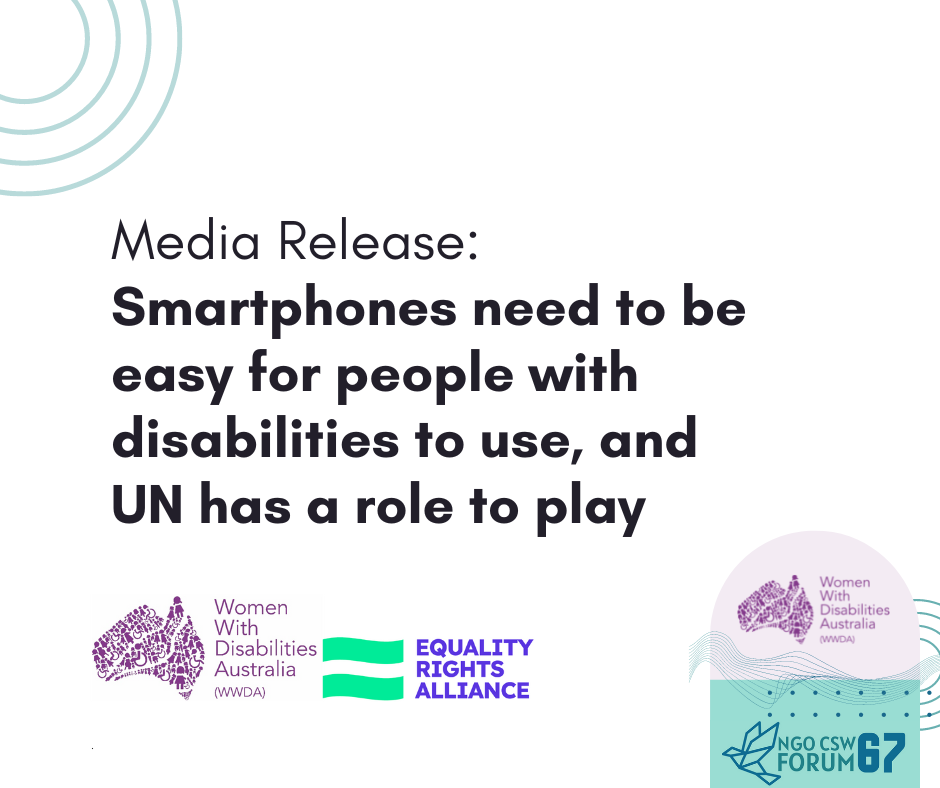23 February 2023
Smartphones and other information computer systems are notoriously hard to use if you have a disability and the United Nations has a global role to play setting better standards for accessibility, says disability and gender equality advocates in Australia.
Claire Bertholli, a member of the Women with a Disabilities Australia (WWDA) Youth Advisory Group and Policy Advisory Group explained:
“The accessibility functions on smartphones are ironically hard to find. They are buried in settings.”
“There should be one button upfront. It should be set up as default in new operating systems so that accessibility functions are turned on and set up to work at the start. You should have to opt out if you don’t need them, rather than opt in.”
“This should be standard for all smartphones, whether Android and iOS, operating systems. The same thing is needed for computer operating systems. Big Tech needs to hear that. These aren’t big asks.”
WWDA and the Equality Rights Alliance have called on the United Nations (UN) to set up a permanent working group on technology and disability to improve assistive ICT access and affordability.
The call comes as members of WWDA and the Equality Rights Alliance prepare to take part in the annual meeting and side-events of the UN’s Commission on the Status of Women (CSW-67) in New York. It starts March 6 and goes for a fortnight.
The theme this year’s CSW is Innovation and technological change, and education in the digital age for achieving gender equality and the empowerment of all women and girls.
Margherita Dall’Occo-Vaccaro, with Women with a Disability Australia and a CSW-67 attendee in New York, said:
“What we propose should be part of the fabric of the UN; a working group made up of people with lived experience of disability.”
“A priority is not simply developing future inclusive technology but ensuring all nation states commit to improving the functions of existing technology so they easier to use for people with a disability.”
“For example, there are many internet hotlines with chat functions and resources like videos for women trying to flee domestic and family violence or wanting mental health support, but the chat options are useless for people who are vision-impaired and the videos rarely have captions for those who are hearing-impaired.”
“Too many browser accessed websites are inaccessible to vision and hearing impaired people.”
“The internet and technology including smartphones are no doubt enablers full of resources to support women in general but women with a disability are commonly overlooked to make the most of those resources.”
Helen Dalley-Fisher, Convenor of the Equality Rights Alliance (also attending CSW in New York in March) added:
“Accessible tech is at heart of participatory democracy. People with a disability still need a base level of access and leadership at the state level is needed to develop that and not assume profit-driven Big Tech will make it happen.”
“Our colleagues at WWDA remind us that women with disability are natural problem solvers. They have to be every hour of their everyday lives. That’s why the international working group proposed must have the lived experiences of women with a disability, people who know how to innovate.”
[ENDS]
MEDIA CONTACTS:
Jacinta Carlton, Media and Communications Officer at WWDA: 0421497770, comms@wwda.org.au
Helen Dalley-Fisher at ERA: 0413 065 822, era@ywca.org.au

